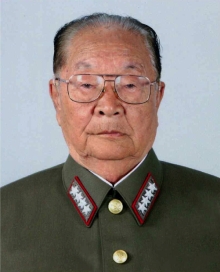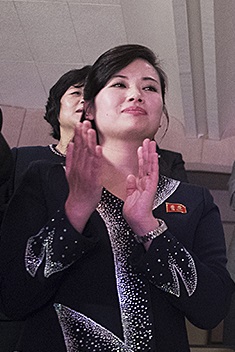| Personal information | |||||||||||||||||||||
|---|---|---|---|---|---|---|---|---|---|---|---|---|---|---|---|---|---|---|---|---|---|
| Nationality | North Korean | ||||||||||||||||||||
| Born | 16 February 1983 | ||||||||||||||||||||
| Sport | |||||||||||||||||||||
| Sport | Diving | ||||||||||||||||||||
Medal record
| |||||||||||||||||||||
Jon Hyon-ju (born 16 February 1983) is a North Korean diver. She competed in the women's 10 metre platform event at the 2004 Summer Olympics. [1]
| Personal information | |||||||||||||||||||||
|---|---|---|---|---|---|---|---|---|---|---|---|---|---|---|---|---|---|---|---|---|---|
| Nationality | North Korean | ||||||||||||||||||||
| Born | 16 February 1983 | ||||||||||||||||||||
| Sport | |||||||||||||||||||||
| Sport | Diving | ||||||||||||||||||||
Medal record
| |||||||||||||||||||||
Jon Hyon-ju (born 16 February 1983) is a North Korean diver. She competed in the women's 10 metre platform event at the 2004 Summer Olympics. [1]

Yon Hyong-muk, also spelt Yong Hyong-muk, was a long-serving politician in North Korea and at the height of his career the most powerful person in that country outside the Kim family. He was Prime Minister of North Korea from 1988 to 1992.

Jo Myong-rok was a North Korean military officer who held the military rank Chasu. In 1998, he was appointed first vice-chairman of the National Defence Commission of North Korea, Director of the Korean People's Army General Political Bureau. Previously, he was the commander of the air defence forces.

Parliamentary elections were held in North Korea on 8 March 2009 to elect the members of the 12th Supreme People's Assembly. They were originally scheduled to be held in August 2008 but were postponed for unknown reasons. Observers of North Korea speculated that it was in relation to Kim Jong-il's ill health.

Parliamentary elections were held in North Korea on 25 August 1948 to elect the members of the 1st Supreme People's Assembly. Organised by the People's Committee of North Korea, the elections saw 572 deputies elected, of which 212 were from North Korea and 360 from South Korea.

Parliamentary elections were held in North Korea on 8 October 1962 to elect the members of the 3rd Supreme People's Assembly. Only one candidate was presented in each constituency, all of which were selected by the Workers' Party of Korea, although some ran under the banner of other parties or state organisations to give the illusion of democracy. Voter turnout was reported to be 100%, with all reportedly voting in favour of the candidates presented.

North Korea participated at the 16th Asian Games in Guangzhou, China.

The death of Kim Jong Il was reported by North Korean state television news on 19 December 2011. The presenter Ri Chun-hee announced that he had died on 17 December at 8:30 am of a massive heart attack while traveling by train to an area outside Pyongyang. Reportedly, he had received medical treatment for cardiac and cerebrovascular diseases, and during the trip, Kim was said to have had an "advanced acute myocardial infarction, complicated with a serious heart shock".

Jon Pyong-ho was a North Korean officer and politician who served as the Chief Secretary of the Korean Workers Party (KWP) Committee of the North Korean Cabinet, and director of the DPRK Cabinet Political Bureau before his retirement in 2010. Jon was described as the 'Chief architect of North Korea's nuclear programme'. Jon was a general of the Korean People's Army and a close adviser to the late Kim Jong-il.

Kim Il Sung died of a heart attack in the early morning of 8 July 1994 at age 82. North Korea's government did not report the death for more than 34 hours after it occurred. An official mourning period was declared from 8–17 July, during which the national flag was flown at half mast throughout the country, and all forms of amusement and dancing were prohibited.

Hyon Song-wol is a North Korean singer, band leader, and politician. She is the leader of the Moranbong Band and of the Samjiyon Orchestra. She was formerly a featured vocalist for the Pochonbo Electronic Ensemble in the early 2000s, a pop group which found fame in North Korea in the late 1980s and 1990s. She has been a member in the Central Committee of the Workers' Party of Korea since 2017.
Ri Hyon-ju is a North Korean diver. He competed in the 10 metre platform at the 2012 Summer Olympics.
Kim Hyon-hui is a former table tennis player from North Korea. Kim is a Merited Athlete. Kim later married a University student, and thus retired.

Kim Chol-man was a North Korean politician and military official. He was a member of several important committees and organizations, including the 6th Central Military Commission, the 6th Politburo, and the Second Economic Committee. He was at the forefront of the North Korean munitions industry, the country's economic base. In old age Kim was no longer considered a major player in North Korean politics, having retired from most of his important posts.

Kim Yang-gon was a North Korean politician and a senior official of the ruling Workers' Party of Korea.
Ryu Ok-hyon is a North Korean long-distance runner. He competed in the men's marathon at the 1992 Summer Olympics.

The 11th Supreme People's Assembly of North Korea was in session from 2003 until 2009. It consisted of 687 deputies, and held six sessions.

Parliamentary elections were held in North Korea on 10 March 2019 to elect the members of the 14th Supreme People's Assembly. The elections were announced on 6 January 2019. With only one candidate on the ballot in each constituency, outside observers described it as a show election. 687 candidates for the DPRK deputies to the SPA were elected. Kim Jong Un did not stand for election, marking the first time that a North Korean leader did not participate as a candidate.
Kim Hyon-il is a North Korean gymnast. He competed at the 2004 Summer Olympics.
Ryang Hyon-ju is a North Korean footballer who plays as a forward for Japan Football League club Veertien Mie and the North Korea national team.